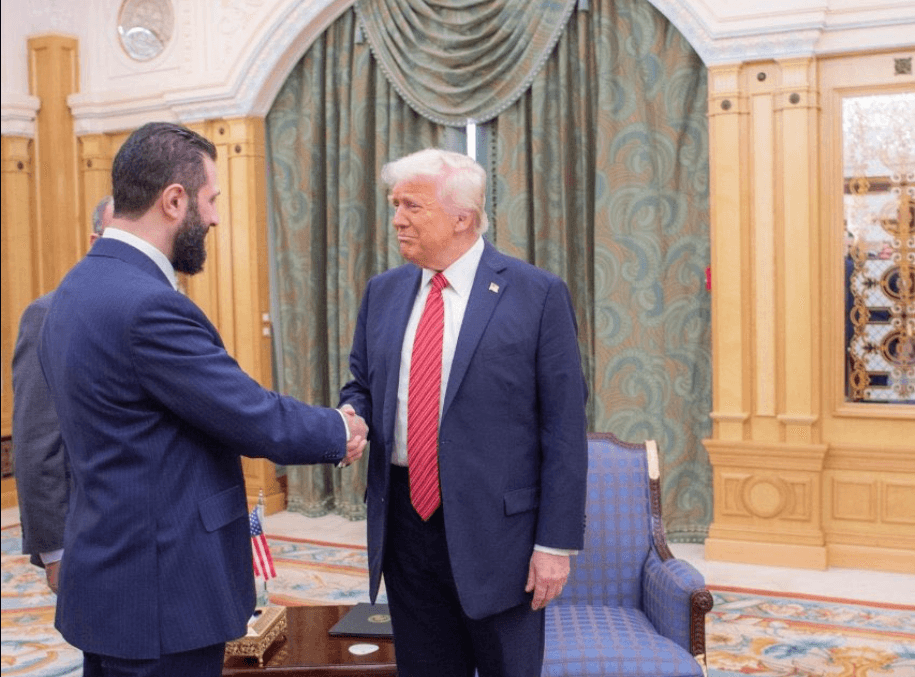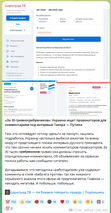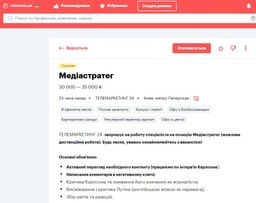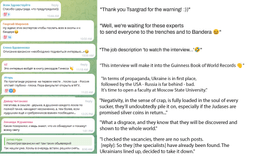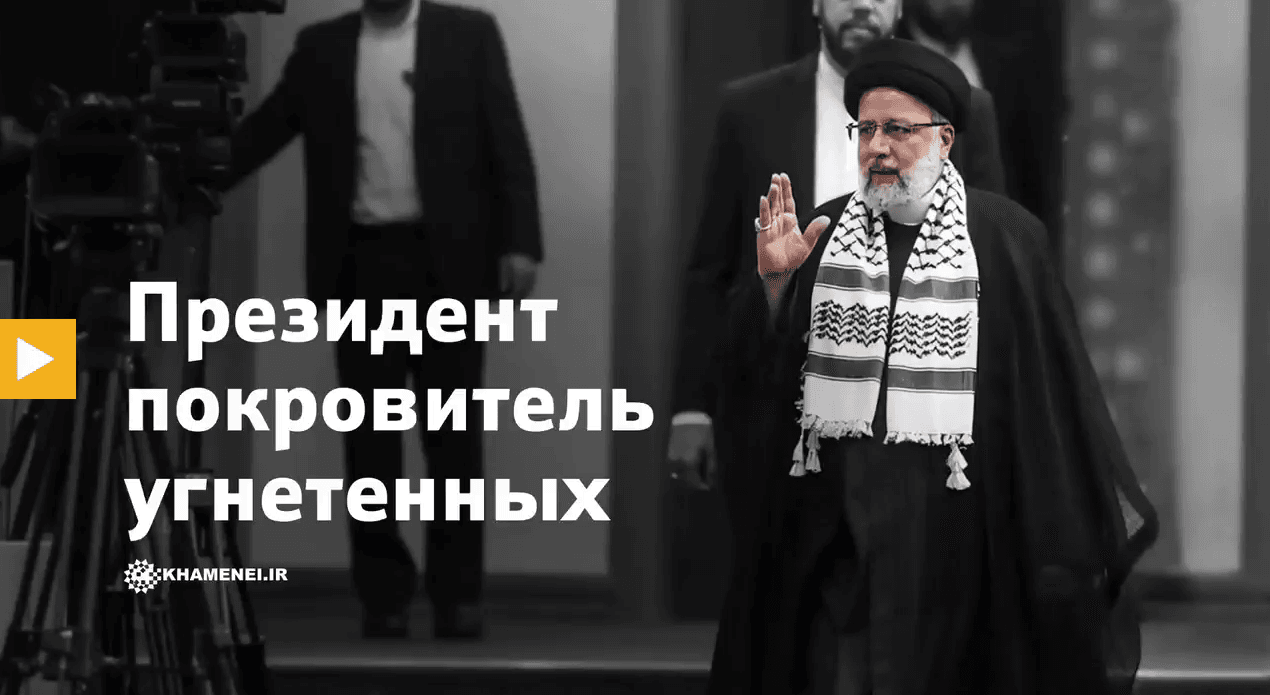Putin Interview: What Russian Propaganda Cares About the Most

Since the announcement, Russian state and pro-state propaganda outlets have been showcasing widespread enthusiasm for the Putin interview with Tucker Carlson. The activity began with Channel One, Russia’s largest state-controlled television network, broadcasting numerous segments dedicated to this event. These segments featured a range of narratives from state-aligned propagandists and influencers to opposition political commentators. Nonetheless, the focus of this WNM piece is primarily on the efforts by the state and its supporters to influence public sentiment surrounding the media event.
Channel One’s response clearly indicated the significance of Putin’s interview as a major media event. This began with Tucker Carlson announcing his reasons for visiting Moscow, a revelation that piqued interest. Channel One boasted that Tucker’s video quickly amassed 75 million views, highlighting the global fascination with the interview and its prominence among internet trends even before its release. The channel further claimed that media entities aligned with the White House and Democrats sought to undermine Tucker’s efforts, even labeling him a Kremlin agent. According to Channel One, Tucker Carlson is the most watched and renowned journalist in the United States.
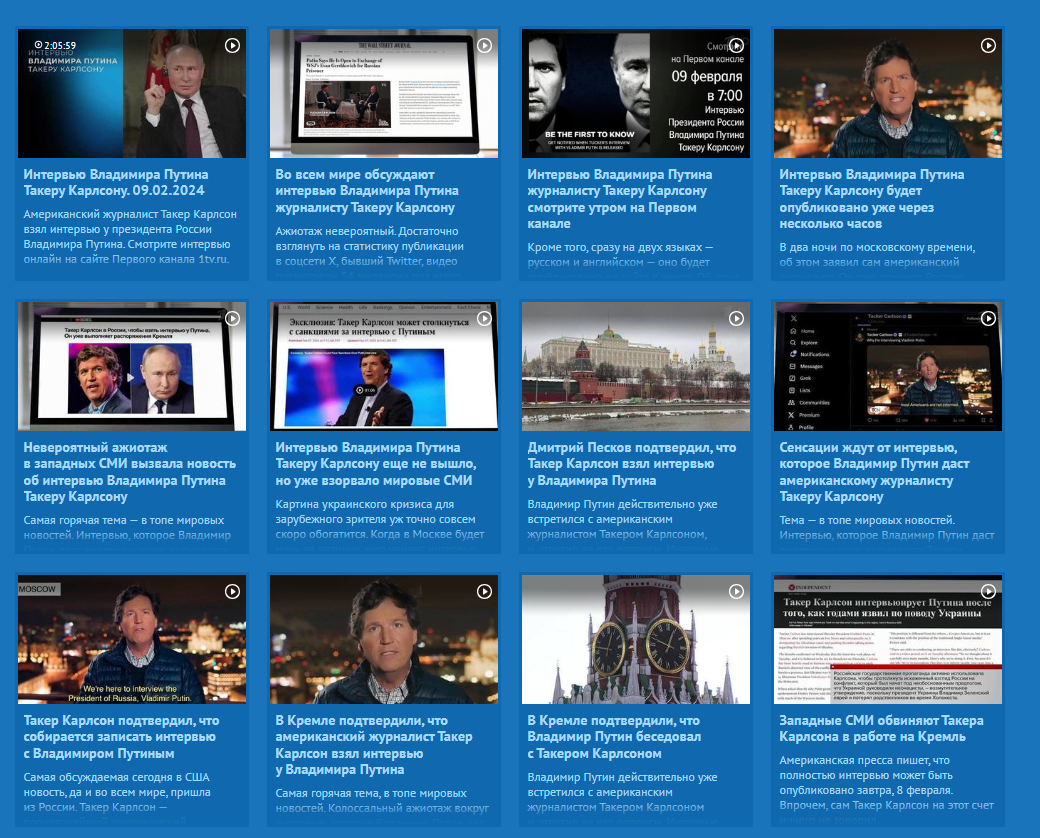
The Channel One website dedicated an entire page to Putin’s interview. (Source: 1tv.ru)
In total, the first state channel released 11 video segments about the interview, with Tucker’s viewership figures becoming a major news point during this period. Among other responses, Channel One speculated on Tucker’s potential inclusion on a sanctions list before the interview aired, suggesting that Western media feared the interview despite not having seen it. Elon Musk was frequently mentioned in these segments, with the narrative expressing gratitude for his willingness to promote the interview on his platform, X.
Additionally, Russian state and aligned media outlets turned their attention to international reactions to the interview. TASS reported on Senator J.D. Vance’s response to the interview but did not take into account his subsequent tweets.
News portal RBC (RosBusinessConsulting) reported a statement from Putin’s spokesperson, Dmitri Peskov, indicating that while the West intended to scrutinize Putin’s interview closely, the reactions from Russians were deemed more significant. Ren TV published a detailed article on international responses to the interview, citing major foreign media sources like The Wall Street Journal, The New York Times, The Mirror, and The Australian, as well as individuals and influencers including Elon Musk, Hillary Clinton, Candace Owens, and Earl Rasmussen, among others. While most of the feedback highlighted was positive, Ren TV also subtly incorporated a few contentious remarks in their coverage.
Tsargrad TV, a television channel known for its pro-Kremlin stance and Russian Orthodox orientation, shared a post on its Telegram channel on 8 February featuring screenshots from Ukrainian job search websites. The post claimed that Ukraine was actively recruiting specialists tasked with writing negative comments about Putin’s interview. This post, showing the effort to explain the future negative commentary as a coordinated Ukrainian online campaign, was also reposted by several pro-state Telegram channels.
Text of the post:
“For 30 Pieces of Silver”: Ukraine Searches for Provocateurs for Comments on Tucker’s Interview with Putin.
For those who subscribe to the truth that “money doesn’t smell,” a gig has been found. Ukraine was so infuriated by the global frenzy over the upcoming airing of the Russian president’s interview that it urgently began searching for commentator provocateurs. For 30,000 silver hryvnias, they are required to write negative comments. Our readers informed us about the job postings on employment search services.
We suspect that the “employer’s” manual already contains comments in the style of “Baba Yaga against,” as no serious analysis of this broadcast is expected. The main thing is to pile on the negativity. And more, more of it.”
The screenshots in question detailed various job listings, the majority of which involved crafting negative comments or content about the Carlson-Putin interview. The descriptions across these listings were notably consistent, featuring similar requirements like criticizing Putin in English, expressing disapproval of Carlson and undermining his credibility as a journalist, and adhering to specific narratives.
The job listing in Ukrainian for a “media strategist” at a company called Telemarketing 24 specified that applicants should be capable of writing negative comments in English about the Carlson-Putin interview.
Screenshots depicted job posts that were very similar to those on the websites, including font and formatting.
WNM closely examined the screenshots presented as evidence and concluded that they had been doctored.
Propaganda materials included screenshots featuring job descriptions, salary ranges, recruitment companies, and the names of websites where these job openings were allegedly posted. This information enabled an investigation into the websites themselves, leading to the discovery of job listings for the same companies, with identical titles and salary ranges. Upon detailed scrutiny, it was revealed that the screenshots had been altered in a graphic editor to align with the propagandistic narrative.
A notable example was a “copywriter” position. The job requirements were mostly retained from the original listing but with minor modifications; administrative tasks such as correspondence management and website development were replaced with skills more pertinent to the narrative, like proficiency in English and creative writing abilities.
This led to a further analytical step: comparing the pixelation of the images. Analysis of the noise patterns revealed that the image distributed by Tsargrad (on the left) exhibited numerous residual pixels indicative of background alterations, with the noise difference highlighting all areas where the original screenshot had been manipulated.
Similar residual pixels were identified in screenshots of other job listings as well.
Also noteworthy were pixels indicative of manipulation surrounding the paragraph that had been altered, whereas the first paragraph, which was retained from the original posting, showed no such glitches.
However, the posts garnered support from Tsargrad’s audience. Following are some of the comments:
The first reactions served as a critical foundation for propaganda analysis, highlighting the interview’s dual purpose: to disseminate President Putin’s message globally via a foreign platform and to demonstrate domestically that the leader is respected and heeded internationally. Concurrently, the propaganda effort aimed to portray any negative feedback in English as part of a coordinated adversarial campaign and to lay the foundation for the further pro-state narratives.
More from the author

